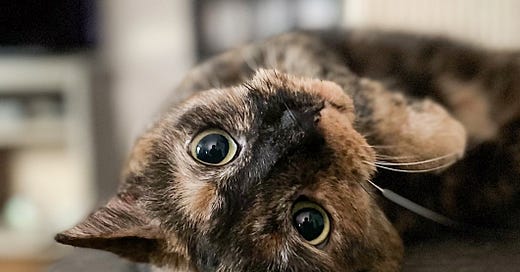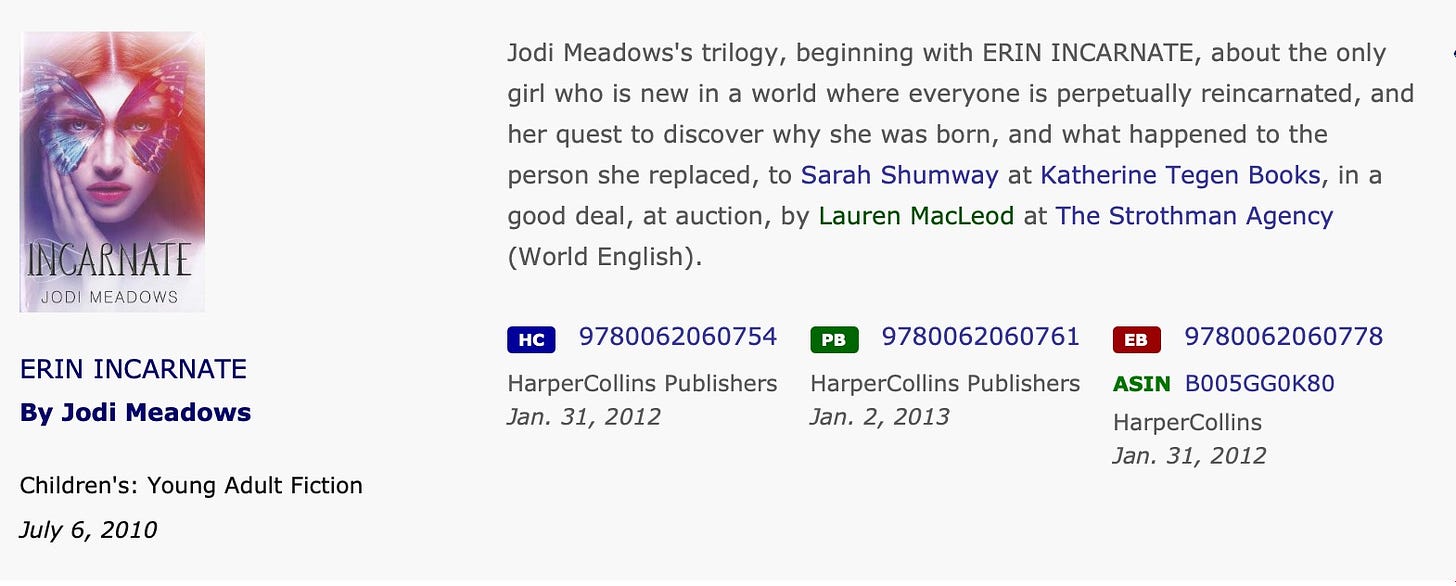When you have to talk to people about your book
Three things you can do to make it easier
With DAWNBREAKER coming out in just a couple of months, it’s nearly time for me to remember how to talk to other human beings. I know some of you are probably naturally good at this. Tell me how you do it. Seriously. Use the comment section.
For those of us who are less comfortable speaking to dozens of strangers, I have a few ways you can get ready.
But first, a commercial break:
Speaking of DAWNBREAKER coming out in just a couple of months, today (September 8) is the last day to use the code PREORDER25 at Barnes and Noble and get 25% off preorders. The more people who preorder DAWNBREAKER, the more my publisher thinks I’m actually cool (lol), and the more likely they are to send me to talk to you in person.
Plus, it helps cats. Look at this face.
Now back to the topic . . .
Doing events can be a nerve-wracking experience, especially if you’re not used to it! I made it through my very first book event fine — I had a lot of familiar faces in a familiar location — but a couple weeks later, my publisher sent me on tour with a few other authors and after the first event, I, uh, had a panic attack and came this close to fainting in the waiting area of a Cheesecake Factory.1 So yeah, it took some effort for me to start feeling comfortable speaking in front of a crowd.
But it turns out, there are a lot of similarities between events. I realized I could just . . . learn how to do them. I could get better at them by preparing a few things in advance. After that, it was practice and experience.
So here are a few things I find helpful to have ready to go.
Know what kind of interaction this is and who your audience is.
There are a lot of types of events you might be doing as an author. School visits, bookstore or library events, workshops, festivals, signings where you sit at a table and try to make eye contact with people walking through the door, and when you do get someone’s attention they just want to know where the bathroom is.
At a school visit, your audience is the students, of course. A bookstore event is likely to have readers — either readers who already like your book or who are interested in reading it. Other audiences probably include writers, or a mix of writers and readers. You might do some events where your audience is booksellers or librarians.
With each audience, you’ll probably share something a little different. Why they should read your book, why they should recommend your book, how they can sell your book, etc. (And sometimes it’s not actually about your selling your book. That’s important to know, too!)
Remember, the people are there because they want to be. They’re already interested in you and your book! (Except maybe in the case of a school visit, but honestly the students are probably happy to get out of whatever class they were supposed to be in, which is generally going to make them like you at least a little bit.)
Figure out how to tell your story.
I say story, but I mean stories. This isn’t about your book. I mean, it is, but you don’t have to read your book out loud to people.2 No, these are the stories about you, about your writing, and about your book.
You’ll end up telling these stories a lot, because people are always going to be curious about a few things:
How did you start writing?
How did you get your idea for this book?
What was it like trying to get published?
What are some of your favorite books/authors or who influenced you growing up?
I know those are very typical interview questions, but someone always wants to know. To make your life simpler, figure out how you want to tell each story. Make it funny. Interesting. Show the challenges you faced. Even if you think the questions are boring, make the answers interesting.
You’ll also be able to fall back onto these stories when you don’t know what else to talk about, or when you’re doing a Q&A and no one has a Q. You can bring them up “casually” like, “People always ask where I get my ideas. . . .” and then launch into your study of history or politics, or the time you accidentally killed a basil plant and had the idea for a whole book like that. Whatever.
A lot of times, these stories are going to work as icebreakers for the audience. It’ll give them an opportunity to get to know you and then ask questions based on what you’ve already told them. Frequently, they are just as scared of you as you are of them! They don’t always know what to talk to you about. If you give them a couple of interesting stories that reveal that you are, in fact, human — or ten ferrets in a trench coat — they’re more likely to feel comfortable asking followup questions.
Figure out how to talk about your book.
You know those pitches you thought you’d never have to do once you got an agent and publisher? Yep. It’s time to pitch your book again.
Sorry. I know this is bad news to some of you.
I like to use the announcement language if I can. (Sometimes this is easy and sometimes it’s hard. It just depends how natural it is to say out loud.) For example, when I tell people about INCARNATE, I say it’s about the only girl who’s new in a world where everyone else is perpetually reincarnated. She has to figure out why she was born and what happened to the person she replaced. That is literally the deal announcement, minus the business stuff:
I had a harder time with some of my more complex books, or deal announcements that aren’t quite as natural to say out loud. But one thing that always works: what does the character want, what is stopping them from getting it, and what happens if they don’t?
When you have a one- or two-sentence pitch, you might want to prepare a slightly longer one for when you have more time to talk about your book.
I like to keep those shorter pitches for events like panels, when there are a bunch of authors and we’re given a minute or two to introduce ourselves. For example, “Hi, I’m Jodi Meadows. I’ve written over a dozen books, including THE ORPHAN QUEEN, about a princess trying to reclaim her kingdom — even if it means using illegal magic — and the masked vigilante who hunts people with magic . . . and oh yeah, he’s hot. And I write one-third of the Lady Janies books, including MY LADY JANE, which is basically the tragedy of Jane Grey meets The Princess Bride and Ladyhawke. We gave Jane a better ending.”
See what I mean? I can say all that in just a minute or so. It gives a good idea of what I write — without going into every single book I’ve written — and lets me pass the mic on to the next author quickly.
When you’re doing an event by yourself, or with just one other author, you’ll have a little more time to pitch your book to the audience. So you can get into a few more details, talk about the worldbuilding, or include themes you think people will connect with.
You also might want to get a few stories ready for different topics in your book, like why you included certain aspects, or research you did that could be interesting for people to hear about. When I was doing events for THE ORPHAN QUEEN, I talked about learning Copperplate calligraphy. When I talk about NIGHTRENDER, I discuss the magical climate crisis they are facing and the way the people in charge of that world just . . . pretend it isn’t happening, even when the evidence is literally all around them.
Look, you know why you wrote your book. You know what made it interesting for you.
That’s what you talk about.
This is definitely not an exhaustive list of Ways To Prepare, but I hope it helps if you’re feeling nervous or have no idea what you’re supposed to do at a book event.3 Honestly, I do think it’s something that can get a lot easier with practice.
And hey, if you’re someone who’s good at this kind of thing and you have have tips to share, please do!
If this was useful for you, please do the button things:
It was genuinely scary, so don’t read this footnote if you’re sensitive to this sort of thing: I started sweating, my vision completely grayed out, and even my hearing faded. It was terrifying. And since I didn’t know the other authors yet — I had literally just met them a few hours before — I just . . . stood there, wanting to find something to lean against, but too scared to move and walk into anyone. Eventually, my vision came back enough that I could get to the bathroom and rinse my face. Then I felt better.
You can read a section if you want, if it’s appropriate for the type of event, but unless you’re a really good reader and you’ve chosen the perfect passage — or you have some kind of schtick — it might not be as fun for the audience. I put reading in a “know your limits” category.
I frequently wish that getting a contract also meant getting access to some kind of media training. Instead, most authors just figure it out on their own and with the help of author friends. Or they don’t figure it out and no one wants to do panels with them. Or, if they can afford it, they pay for professional training.






Great article! I've only done solo bookstore events and conventions, but I find them quite natural to do (I'm an extrovert and live throwing big parties, so kinda in my element!)
Among other tips, be ready to vamp when no one has a question. There's nothing worse than an awkward silence following "Any questions?" So I'll just babble for a minute while people get their act together.
"Does anyone have any questions for me? About the book, or about life in general? Or maybe my strong opinions on why Neville and Luna should have ended up together? The best 24-hour diners nearby? The things you've always yearned to know, but haven't asked! My hopes, my fears, my dreams... Even that one dream I had last week about a potato trying to eat me..."
People will laugh, it won't be awkward, and inevitably someone will raise a hand with a question after like thirty seconds of this.
Do you think it was harder talking to a group where you know a lot of the people, for example, from school, or total strangers?